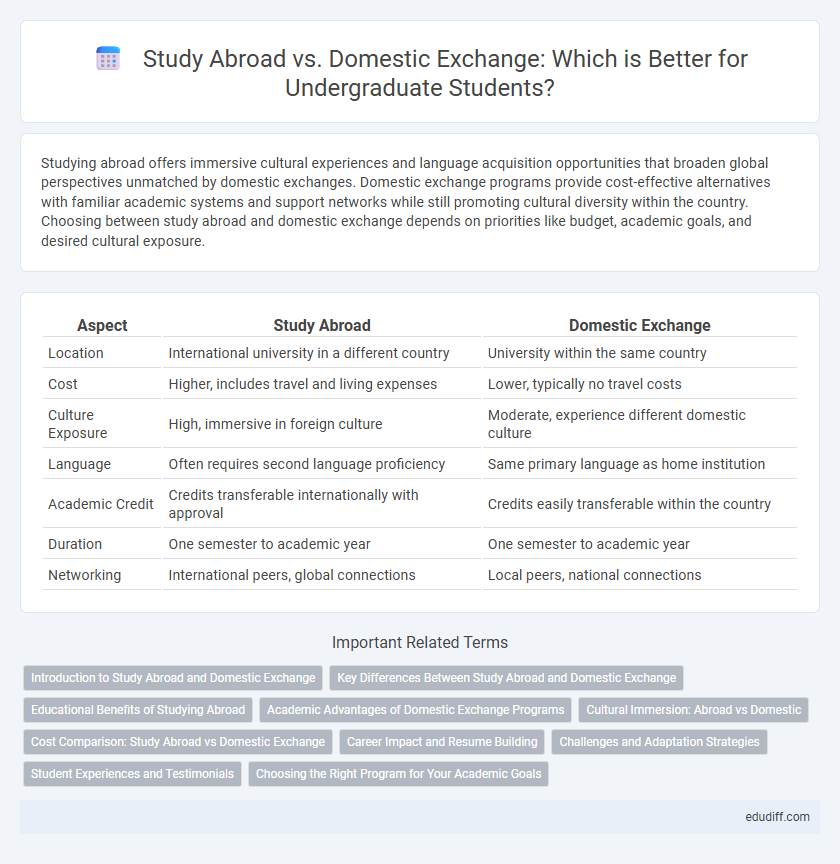Studying abroad offers immersive cultural experiences and language acquisition opportunities that broaden global perspectives unmatched by domestic exchanges. Domestic exchange programs provide cost-effective alternatives with familiar academic systems and support networks while still promoting cultural diversity within the country. Choosing between study abroad and domestic exchange depends on priorities like budget, academic goals, and desired cultural exposure.
Table of Comparison
| Aspect | Study Abroad | Domestic Exchange |
|---|---|---|
| Location | International university in a different country | University within the same country |
| Cost | Higher, includes travel and living expenses | Lower, typically no travel costs |
| Culture Exposure | High, immersive in foreign culture | Moderate, experience different domestic culture |
| Language | Often requires second language proficiency | Same primary language as home institution |
| Academic Credit | Credits transferable internationally with approval | Credits easily transferable within the country |
| Duration | One semester to academic year | One semester to academic year |
| Networking | International peers, global connections | Local peers, national connections |
Introduction to Study Abroad and Domestic Exchange
Study abroad programs offer undergraduate students immersive international experiences that enhance cultural understanding and global perspectives, often lasting a full semester or academic year. Domestic exchange programs enable students to study at another institution within their home country, providing access to diverse academic resources and regional networks without the challenges of international travel. Both options expand educational horizons but vary significantly in cultural exposure, cost, and logistical complexity.
Key Differences Between Study Abroad and Domestic Exchange
Study abroad programs immerse undergraduate students in foreign cultures, languages, and academic systems, offering global perspectives and international networking opportunities. Domestic exchange programs allow students to experience different universities within their own country, providing academic diversity without the challenges of adapting to a new country. Key differences include cultural immersion, language barriers, cost variations, and credit transfer policies between foreign and home institutions.
Educational Benefits of Studying Abroad
Studying abroad offers immersive cultural experiences and access to diverse academic perspectives, enhancing critical thinking and global awareness beyond the home university curriculum. Exposure to international faculty and varied teaching methodologies fosters adaptability and innovative problem-solving skills crucial for a competitive job market. These educational benefits contribute to a well-rounded undergraduate experience, promoting both personal growth and professional development.
Academic Advantages of Domestic Exchange Programs
Domestic exchange programs offer undergraduate students tailored academic experiences closely aligned with their home institution's curriculum, facilitating seamless credit transfers and academic progression. These programs provide access to specialized courses and research opportunities within familiar educational frameworks, enhancing subject mastery and practical application. Students benefit from networking with diverse peers in their country, fostering collaborative learning and professional development while minimizing cultural adjustment challenges.
Cultural Immersion: Abroad vs Domestic
Studying abroad offers unparalleled cultural immersion by exposing students to diverse languages, traditions, and social norms that foster global awareness and adaptability. Domestic exchanges provide cultural engagement within one's own country, allowing exploration of regional differences, local customs, and indigenous perspectives while maintaining familiar societal frameworks. Both options enhance cultural competence, yet international programs typically deliver a more intense and transformative cross-cultural experience.
Cost Comparison: Study Abroad vs Domestic Exchange
Study abroad programs generally entail higher costs including international airfare, visa fees, and overseas living expenses, whereas domestic exchanges typically incur lower expenses confined to in-country travel and accommodation. Financial aid and scholarships often vary significantly, with many institutions offering limited funding for study abroad compared to more accessible support for domestic exchange. Evaluating total cost of attendance remains crucial as study abroad offers diverse cultural immersion at a premium, while domestic exchange provides affordable access to new academic environments within the home country.
Career Impact and Resume Building
Participating in a study abroad program offers unique international experience that enhances cross-cultural communication skills and global adaptability, making resumes stand out to employers seeking diverse candidates. Domestic exchange programs strengthen local networks and deepen understanding of national markets, providing practical career benefits within familiar industry contexts. Both options contribute valuable career impact, but the choice depends on whether students prioritize global exposure or regional professional connections.
Challenges and Adaptation Strategies
Study abroad programs present challenges such as cultural shock, language barriers, and homesickness, requiring students to develop strong intercultural communication skills and resilience. Domestic exchange programs often involve adapting to different academic systems and regional cultural nuances, promoting flexibility and effective time management. Both experiences demand proactive engagement, seeking support networks, and openness to new perspectives for successful adaptation.
Student Experiences and Testimonials
Students participating in study abroad programs report enhanced cross-cultural communication skills and greater adaptability compared to domestic exchange peers, who often highlight the comfort of familiar environments and academic continuity. Testimonials from undergraduates emphasize that study abroad fosters global networking opportunities and personal growth, while domestic exchanges provide a smoother transition with focused curriculum alignment. Data from university surveys indicate higher satisfaction rates among study abroad participants regarding cultural immersion and language proficiency development.
Choosing the Right Program for Your Academic Goals
Selecting the ideal study abroad or domestic exchange program depends on aligning the curriculum with your academic goals, such as gaining international perspectives or deepening expertise in your major. Programs offering specialized courses, research opportunities, and relevant internships enhance skill development and career prospects. Evaluating factors like language proficiency, cultural immersion, and credit transferability ensures the chosen program supports your long-term educational objectives.
Study Abroad vs Domestic Exchange Infographic

 edudiff.com
edudiff.com